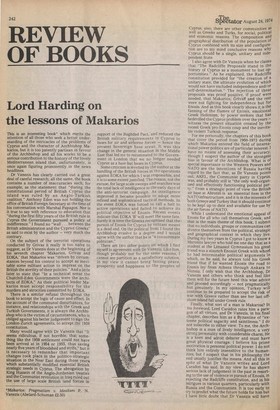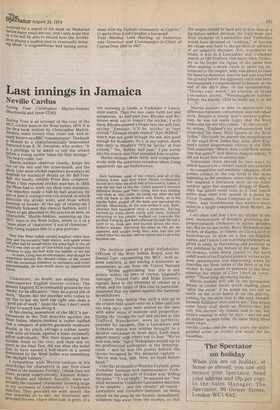itEVIEW
OF BOOKS
Lord Harding on the lessons of Makarios
This is an interesting book* which merits the attention of all those who seek a better understanding of the intricacies of the problems of Cyprus and the character of Archbishop Makarios, but it is too patently partisan in favour of the Archbishop and all his works to be a serious contribution to the history of the lovely Mediterranean island that, unfortunately, is once again figuring prominently in the news headlines.
Dr Vanezis has clearly carried out a great deal of careful research; all the same, the book contains a number of inaccuracies such, for example, as the statement that "during the constitutional period of British Cyprus the island was ruled by an Anglo-Turkish coalition." Anthony Eden was not holding the office of British Foreign Secretary at the time of his conversation with Marshal Papagos. Nor is it true to say with reference to education that "during the first fifty years of the British rule in Cyprus the Government pursued a policy of indifference." I found no "wall .. . between the British administration and the Cypriot Greeks" as said to exist bj the author — very much the contrary. On the subject of the terrorist operations conducted by Grivas it really is too naive to suggest, as Dr Vanezis does at the beginning of his seventh chapter `Makarios, Grivas and EOKA,' that Makarios was "driven by circumstances beyond his control to accept as inevitable some militant action to impress on the British the sterility of their policies." And a little later to state that "In a technical sense the Churchill-Eden Governments were the architects of EOKA." As their political leader Makarios must accept responsibility for the murders and atrocities committed by EOKA.
There is a similar refusal throughout the book to accept the logic of cause and effect. In the account of the communal disturbances, for instance, and relationships with the Greek and Turkish Governments, it is always the Archbishop who is the victim of circumstances, who is obliged against his better judgement to sign the London-Zurich agreements, to accept the 1959 constitution.
Many would agree with Dr Vanezis that "It seems ridiculous, if not horrible, that something like the 1959 settlement could not have been arrived at in 1954 or 1.955, thus saving nearly five years of bloodshed and strife," but it is necessary to remember that important changes took place in the politico-strategic situation in the Near East during those years which substantially modified essential British strategic needs in Cyprus. The abrogation by King Hussein of the Anglo-Jordanian treaties and the Communist revolution in Iraq ruled out the use of large scale British land forces in
support ot the Baghdad Pact, and reduced the British military requirements in Cyprus to bases for air and airborne forces — hence the present Sovereign base areas. It was this change in the general situation in the Middle East that led me to recommend to the Government in London that we no longer needed Cyprus as a base but bases in Cyprus. Some criticism is levelled by the author at the handling of the British forces in the operations against EOKA for which I was responsible, and it is to some extent justified. The reason, not the excuse, for large scale sweeps and searches was the total lack of intelligence in the early days of the anti-terrorist campaign. As intelligence improved it became possible to adopt more refined and sophisticated tactical methods. In the event EOKA was forced to call a halt to active operations and failed to achieve its political objective of Enosis. Recent events indicate that EOKA 'B' will meet the same fate. Surely it is time the Greeks recognised that thepursuit of Enosis for Cyprus by militant means is a dead end. On the political front I found the Archbishop evasive to a degree and I would agree with the author that he is "a consummate politician." There are two other points on which I find myself in agreement with Dr Vanezis. Like him, though probably not for the same reasons, I cannot see partition as a satisfactory solution. In my view it cannot bring lasting peace, prosperity and happiness to the peoples of
Cyprus; also, there are other communities as well as Greeks and Turks, for social, political and economic reasons. The composition and geographical distribution of the population of Cyprus combined with its size and configuration are to my mind conclusive reasons why inde
pendent should be a single, unitary and State.
I also agree with Dr Vanezis when he claims that "The Radcliffe Proposals stand in the history of Cyprus as a monument to lost Opportunities." As he explained, the Radcliffe constitution provided for "the creation of a unitary state, the ultimate evolution of which would not have excluded independence and/or self-determination." The rejection of these proposals was proof positive, if proof were needed, that Makarios, Griva'S and the rest were not fighting for independence but for Enosis. And as this book clearly shows it. is the fanning of the flames of Enosis, emotional Greek Hellenism, by power seekers that has bedevilled the Cyprus problem over the years — witness the present situation created by the recent Greek pro-Enosis coup and the inevitable violent Turkish response. For me personally, the chapters of this book that cover the period from 1960-1973 during which Makarios entered the field of international power politics are of particular interest. I have no means of assessing their accuracy, though I suspect the author of the strongest bias in favour of the Archbishop. What is of special importance to the Western Powers and NATO are the intentions of Russia having regard to the fact that, as Dr Vanezis points out, AKEL, the Communist party in Cyprus. was, and probably still is "the only well-organised and effectively functioning political party." From a strategic point of view the British air base at Akrotiri is an essential item in the NATO infrastructure, and it is in the interests of both Greece and Turkey that it should continue to be kept up to date and available for use by the air forces of NATO.
While I understand the emotional appeal of Enosis for all who call themselves Greek, and that is the main theme of this book, I submit that no individuals, groups or communities can divorce themselves from the political, strategic and geographical context in which they live. During my two years in Cyprus I got to know a Maronite lawyer who told me one day that as a student at the Limassol Gymnasium his great friend was a staunch Enosist Greek with whorii he had interminable political arguments in which, so he said, he always told his Greek friend that if he wanted Enosis the road to Enosis lay from Athens through Ankara to Nicosia. I only wish that the Archbishop, Dr Vanezis and others who think and feel like them will for the future heed this wise advice and proceed accordingly — not pragmatically but genuinely. In my opinion, Turkey will continue to be prepared to accept the risk of war with Greece rather than see her last offshore island fall under Greek rule.
Finally, what sort of a man is Makarios? In his foreword, Lord Caradon rates him a paragon of all virtues, and Dr Vanezis, in his final chapter, describes him as a Byzantine of "extreme political sagacity and saintliness." I do not subscribe to either view. To me, the Archbishop is a man of lively intelligence, a very strong personality with considerable charm. He is a keen and adroit debater and must have great physical courage. I believe his prime motivation is personal political power. I do not think him entirely insensitive to the humanities, but I suspect that in his philosophy the end usually justifies the means. And all this in spite of what Dr Vanezis writes and Lord Caradon has said. In my view he has shown serious lack of judgement in the past in resorting to the use of violence in pursuit of Enosis, in rejecting the Radcliffe constitution, and in his intrigues in various quarters, particularly with Russia and the Communists. It is too early to try to predict what the future holds for him but I have little doubt that Dr Vanezis will have
material for a sequel to his book on Makarios before many years are out, and I only hope that in it he will be able to record how the Archbishop played a leading part in eventually bringing about "a magnanimous and lasting settle
ment with the Turkish community in Cyprus," to quote from Lord Caradon's foreword. Field Marshal Lord Harding of Petherton was Governor and Commander-in-Chief of Cyprus from 1955 to 1957.



































 Previous page
Previous page